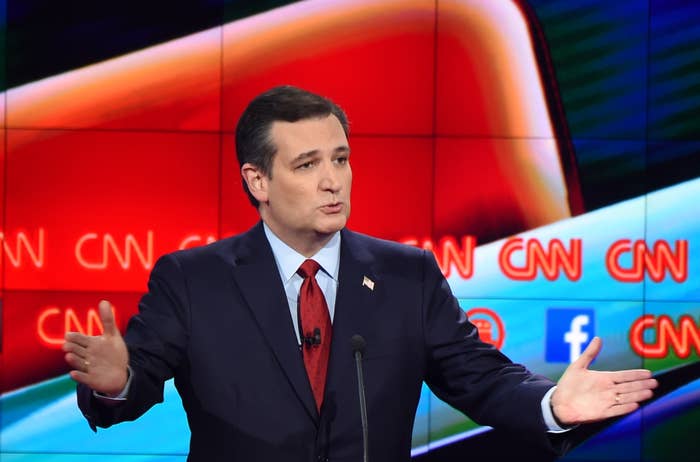
LAS VEGAS — The leading contenders for the Republican nomination brought a central schism in the party’s foreign policy to the fore on Tuesday night: how to handle dictators.
In a campaign year increasingly dominated by national security issues, this section of the debate encapsulated the split between Republicans on whether democracy promotion abroad is in the United States’ national security interests. Ted Cruz and Rand Paul explicitly made the case that Libya, Iraq, and Egypt would have been better off under their now-deposed dictators. On the other side of the debate, candidates like Jeb Bush and Marco Rubio defended, to various degrees, U.S. interventions that have resulted in toppling dictators.
In recent weeks, Cruz and Rubio have increasingly placed each other in their crosshairs — and this represents a critical split between the rising contenders.
Debate moderator Wolf Blitzer kicked it off by posing this question: “Sen. Cruz, you have said the world would be safer today if Saddam Hussein were still in power in Iraq, Moammar Gadhafi ruled Libya, and Hosni Mubarak ruled Egypt. So would it be your policy to preserve dictatorships, rather than promoting democracy in the Middle East?”
“Assad is a bad man. Gadhafi was a bad man. Mubarak had a terrible human rights record,” Cruz responded. “But they were assisting us — at least Gadhafi and Mubarak — in fighting radical Islamic terrorists.”
“Instead of being a Woodrow Wilson democracy promoter we ought to hunt down our enemies and kill ISIS rather than creating opportunities for ISIS to take control of new countries,” Cruz said.
Cruz has positioned his foreign policy as a third way between the libertarian views of Rand Paul and the hawkish ones of Marco Rubio. He’s in Paul’s corner on this issue, however, and they aren’t the only ones — Donald Trump and Ben Carson, who like Cruz have captured much of the non-establishment attention this year, also voiced skepticism of this kind of regime change.
Trump said he regarded toppling dictators as a waste of money that could be better spent on infrastructure.
“In my opinion, we've spent $4 trillion trying to topple various people that frankly, if they were there and if we could've spent that $4 trillion in the United States to fix our roads, our bridges, and all of the other problems; our airports and all of the other problems we've had, we would've been a lot better off. I can tell you that right now,” Trump said.
“No one is ever better off with dictators but there comes a time you know, when you're on an airplane, they always say,’"in case of an emergency oxygen masks will drop down. Put yours on first and then administer help to your neighbor,’” Carson said. “We need oxygen right now. And we need to start thinking about the needs of the American people before we go and solve everybody else's problems.”
The George W. Bush administration represented the moment when regime change was most in vogue in Republican foreign policy. But since the Iraq War there has been a shift towards tolerating secular dictators in the Middle East, no matter how loathsome, instead of toppling them and risking empowering militant groups. This is a view that Cruz espoused at length in an address to the Heritage Foundation last week that drew upon the influential views of Reagan’s U.S. Ambassador to the U.N. Jeane Kirkpatrick, who argued that the U.S. should support allied dictators.
Meanwhile, Jeb Bush defended his previous assertion that getting rid of Hussein was a “pretty good deal,” saying he still feels that way. And Chris Christie’s response showcased the tension in the current iteration of this debate: whether to fight ISIS or Assad, and by proxy his Iranian sponsors. “We need to focus our attention on Iran, because if you miss Iran, you are not going to get ISIS,” he said. “The two are inextricably connected because one causes the other.”
Rubio, for his part, mentioned the Lockerbie bombing as an example of a secular dictator posing a threat to American national security, saying, “Muammar Qaddafi is the man that killed those Americans over Lockerbie, Scotland.” Rubio also obliquely defendaed removing Hussein. “And you want to know why Muammar Qaddafi started cooperating on his nuclear program? Because we got rid of Saddam Hussein. And so he got scared that he would be next, and that's why he started cooperating.”
Rubio stopped short of calling for Assad’s ouster, though he indicated he would rather have him gone. “Look, we will have to work around the world with less than ideal governments. The government in Saudi Arabia is not a democracy, but we will have to work with them. The government in Jordan is not perfect, but we will have to work with them. But anti-American dictators like Assad, who help Hezbollah, who helped get those IEDs into Iraq, if they go, I will not shed a tear.” (Despite statements like these, Rubio didn’t vote for airstrikes against the Assad regime in Syria when the issue came up for a vote in 2013, though he called for Assad’s “removal.”)
Rubio appears prepared to bet that Republican voters fall more into his camp than Cruz’s: His campaign sent out a fundraising email after the debate’s conclusion calling Cruz and Paul “the isolationist tag team duo.”
